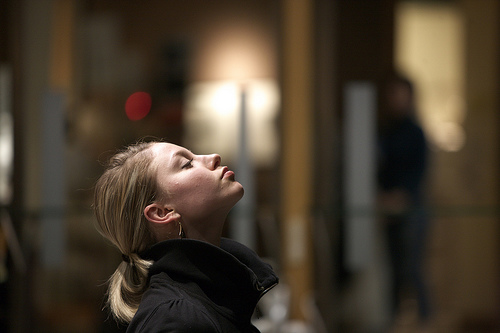The power of noticing emotions
In order to accept a feeling or sensation (or a thought), we have to notice it first. The metaphor of observing like a curious scientist helps to foster openness and curiosity towards our own feelings – approach instead of avoidance. The simple act of observing or noticing a feeling with curiosity rather than being caught up in in often leads to acceptance – and if not, at least it is a step in the right direction.
Here’s a guide to how to take that step in the right direction:
- When you have a feeling, notice that you are having it. Notice where you feel it. Notice where it is most intense.
- Many people (but not all) find breathing into a feeling helps them make room for it. Slow, diaphragmatic breathing seems to be particularly helpful. So try noticing the feeling, and gently breathing into it.
- When you notice the feeling, and where you feel it, see if you can just imagine opening up around it a little. Give it some space.
- If this feeling was an object, ask yourself what it would look like? When you notice the feeling, you might notice that it starts to change. Notice if it does, but don’t force it. Does it get smaller? Perhaps it might get bigger. Remember though – no matter how big the feeling gets, it can’t get bigger than you. So notice it, observe it, breather into it, and make room for it.
Losses that we experience can leave us with painful feelings – this is only natural. You can notice and make room for those feelings without getting bogged down in a struggle with them. This will leave you much more able to engage fully with life, and doing what matters to you. When we recognise that it is normal and natural to have painful feelings – that it is an unavoidable and inevitable part of being human – we are more likely to accept them. If you have a story that you tell yourself that normal people don’t feel this way – there must be something wrong with me, this is going to have a big influence on your attitude towards your feelings.
Here’s an exercise to try – read the opening paragraph first
Most people agree (with some quibbling around the edges) that there are nine basic human emotions. As you read through the list below, I want you to classify them as either negative / bad emotions, or good / positive emotions. One or the other – thumbs-up or thumbs-down – no hesitation – just your immediate response.
Ready? Start reading.
- Love
- Joy Curiosity
- Anger
- Fear
- Sadness
- Guilt
- Shock
- Disgust
I’m guessing that you gave the thumbs-down for 6 out of the 9 basic, normal human emotions. Does that tell you anything about what it means to be human? Two-thirds of the emotions that every person will experience throughout life do not feel great. But we live in a feel-good society that tells us we should feel good all the time.
How realistic is that?
- Self-compassion – being caring and kind to yourself – adds another dimension to acceptance. Let’s go back to you noticing a feeling – which may be one you don’t like. Place a hand on where you experience most intensely, and see if you can open up around it. Hold it gently.
- Sometimes, we want to focus on our emotions, like when we are learning to notice them (like now), or if we are grieving. At other times, if we are too intently focused on our emotions that can get in the way of living life. When we can notice that the feeling that we struggling with doesn’t have to have the spotlight – that it is one of many actors on a well-lit stage, we can start to notice that the feeling we are struggling with is just one of many. It isn’t the only actor on stage: it isn’t the whole show.
Notice that feeling and observe your breathing. Notice your body, and observe the room around you. Notice that there is a lot going on.
Dr Sarb Johal is the Director of Equanimity Limited and Associate Professor of Disaster Mental Health at Massey University’s Joint Centre for Disaster Research. He spends quite a lot of his work time providing advice to the Ministry of Social Development and CERA on aspects of recovery from the Canterbury earthquakes. When not working, Sarb spends a bit of his time writing and running, though not at the same time. He has completed numerous half-marathons, 4 international marathons and 1 ultra-marathon from 2010-2012. He is a certified Leader in Running Fitness, and is also training to be a Personal Trainer.
You can read more of his thoughts on health, wellbeing and mental fitness at completecoach.wordpress.com
loading...
loading...
Tags: emotion




great thing to focus on. emotions and thoughts are so often reactions which govern our entire perspective of the world around us. by observing, then accepting our emotions or thoughts, we realise that our reactions to the world are wholly our own choices. there may need to be anger, sadness, and fear that needs to first be expressed and released, and for forgiveness to happen too, but once we can clearly accept our emotions as our own, without pointing to some external ’cause’, we realise that the world we live in is actually a world which we choose to create ourselves each moment, by how we choose to respond. very empowering stuff, and a cornerstone to realising that we do truly create our own realities!
loading...
loading...